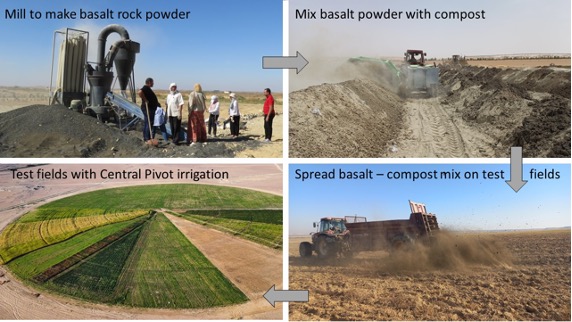Heliopolis University testing basalt in agriculture for climate and fertilization
Farms4Climate partners Heliopolis University and SEKEM have started an innovative project based on greening the desert by agriculture and applying basalt rock powder to those agricultural fields, with the aim of assessing CO₂ sequestration and the effects on crop production.
"Let mother earth help to save the earth": formulated by Dutch professor Dr. Olaf Schuiling, offers an exciting approach to help solve the climate change problem. A basic interpretation of this sentence is that we should work in harmony with natural processes, simply guiding them a little in order to counteract the climate mess our society is creating. In this context, Farms4Climate partners Heliopolis University and SEKEM have started an exciting innovative project on SEKEM's farm in Al Wahat Al Bahariya: greening the desert by agriculture (increase plant growth) and applying basalt rock powder to those agricultural fields (rock dissolution), as both aspects effectively sequester CO₂ from the atmosphere.
Thanks to this PRIMA project, we are testing the effectiveness of basalt rock powder application on 10 hectares of irrigated agricultural land on the Al Wahat farm. Eight crops are treated each with 3 different mixtures of basalt and compost at the same time. HU staff and students are collecting samples and data on crops, soil, and water. The tests will try to answer questions such as: how much basalt powder must be applied per hectare, how much carbon dioxide can be removed from the atmosphere every year per hectares (carbon credits!), how much increase in crop production can be shown (nutrients from basalt), what are the cost/ton of crop, and what are other positive or negative effects of using basalt in agriculture?
If the benefit of basalt to agriculture can be demonstrated, the potential to apply this all over Egypt is huge indeed: farmers will benefit because expensive chemical fertilizers can be exchanged for a cheap, fully natural product (basalt rock powder), which is widely available; together with the "organic" approach to agriculture, it helps to improve soil health, and carbon credits can be registered and sold by farmers, all improving their income. Egypt as a country can remove more than 20 million ton of carbon dioxide from the atmosphere per year through agriculture, representing ten percent of current emissions. Exciting prospect!
How
unique is the Heliopolis University basalt project? World-wide, there are
currently 6 other locations where similar tests are being done, but the one in
Egypt is the only one in a desert climate. The idea of adding basalt to
agricultural land is more and more becoming accepted. However, the key
questions still to be answered are: what is the cost per ton of crop, and how
much carbon is removed from the atmosphere per ton of basalt applied. This is
what we as partners in Farms4Climate work on!

